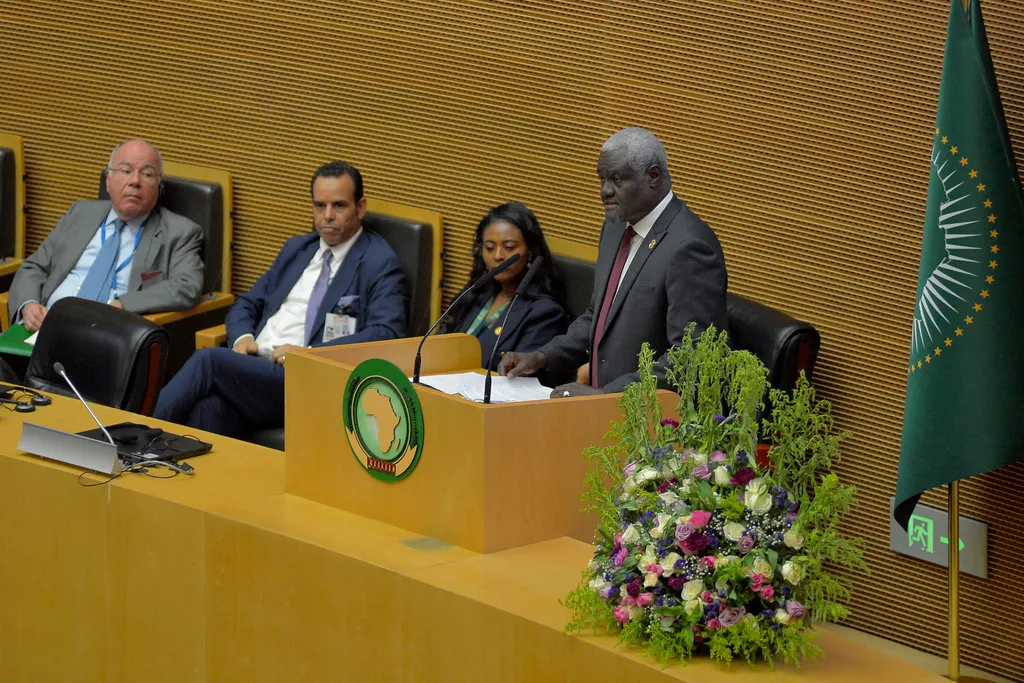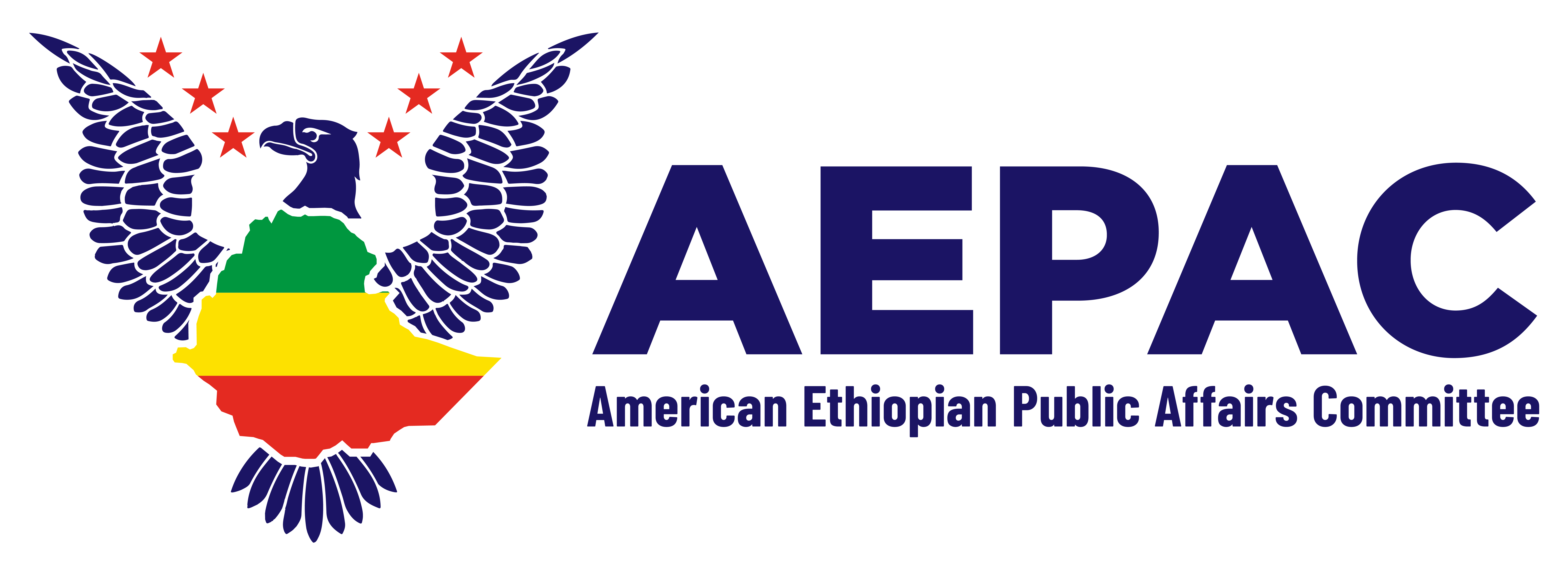By Mesfin Tegenu

African Union (AU) Commission Chairman Moussa Faki, addresses the opening session of the 37th Ordinary session of the Assembly of the African Union (AU) Summit at the AU headquarters in Addis Ababa, Ethiopia, Saturday, Feb. 17, 2024. Leaders at the summit have condemned Israel’s offensive in Gaza and called for its immediate end.
In recent months, the name Birtukan Temesgen has become synonymous with years of human-rights abuses in Ethiopia. That country has largely become a failed state under the rule of its strongman, Prime Minister Abiy Ahmad, despite — or maybe in part because of — generous aid from the U.S. and the West.
In 2019, Birtukan had overcome a rough childhood in Africa’s second-most populous nation to become a thriving student at Dembi Dolo University. One day, while walking across the campus, she was kidnapped by gunmen and brought to a remote corner of the Ethiopian jungle, where she says she was raped and forced to give birth to a child.
Six years later, Birtukan emerged to tell her story through interviews and a documentary, captivating the nation. However, in a subsequent interview, she recanted her story — a move many believe was coerced.
Her saga has also called attention to dozens of similar kidnappings and missing students over the last six years. The lack of accountability for the lethal campaign of ethnic cleansing against her ethnic Amhara people by the Abiy regime continues, even as the Ethiopian ruler basks in the Nobel Peace Prize he was awarded by the West in 2019.
The U.S., under both Democratic and Republican administrations, has largely ignored civil war, endemic corruption and economic decline under Abiy’s rule. For years, it continued to offer carrots of humanitarian and developmental aid, including a recent major bailout through the International Monetary Fund, while not deploying the stick of consequences for the regime’s crimes against humanity.
Although much remains up in the air, President Trump’s return sent a clear signal that this era is over. It is rapidly being replaced with an “America First” policy that centers economic self-interests of both the U.S. and its potential trading partners while downplaying democratic concerns.
The contours of this dramatic change became clear in the early days of Trump’s second term, as the returning president and his cost-cutting team led by billionaire Elon Musk all but shut down the U.S. Agency for International Development, and mostly cut off the spigot of foreign aid that, across Africa, has paid for programs like disease eradication and free school lunches. The U.S. government spent a whopping $6.5 billion on aid to sub-Saharan Africa last year.
The apparent end of large-scale U.S. foreign aid is a crisis that also creates an opportunity. Trump’s “America First” policies are now reality for the next four years, if not longer. It creates an opening for forward-thinking countries, including Ethiopia, to forge their own “Africa First” policies that will rebuild the continent through enhanced trade and human rights reforms, not handouts from the West.
Seleman Yusuph Kitenge of African Union Development Agency-NEPAD argued forcefully for an “Africa First” policy in a recent op-ed, noting that too often governments in the region use foreign aid from the U.S. or elsewhere to prop up flagging government services rather than on permanent economic development.
“An ‘Africa First’ approach should emphasize domestic resource mobilization, strengthening transportation systems and other social services, as well as the advancement of institutions and human capital,” Kitenge wrote. “This shift would strengthen Africa’s economic independence while reducing reliance on foreign aid.”
The shock of the American aid cut-off should force African leaders to focus on the untapped economic potential of the continent, which is home to a massive consumer market and potential workforce. This would mean expanding the scope and the power of the current African Continental Free Trade Area, reining in the current black market that causes governments to lose billions of dollars in potential annual tax revenue and a serious effort to eliminate endemic corruption.
The bigger idea here is not to recoil at the notion of an “America First” policy in Washington but to seek inspiration from it. This philosophy could be likewise harnessed to advance business partnerships, innovation, economic development and good governance to help Africa emerge as a continent of the future.
An “Africa First” policy could especially benefit Ethiopia, which has struggled throughout its modern history under the yoke of Western colonialism that has too often sought to divide the proud nation by ethnic groups building resentment against each other to prevent a strong, unified independent source in the populous and resource-rich Horn of Africa. Ironically, this divide-and-conquer approach has hurt the United States as much as Ethiopia, by encouraging other superpower nations such as China and the up-and-coming Gulf powers to jockey for influence.
There remain powerful incentives for African governments to cooperate with the Trump administration, including favorable trade deals, security assistance and access to American markets.
There are also good reasons for America to continue to offer security aid, based on mutual interests to combat terrorism or to minimize other regional conflicts. Nor does an “America First” policy eliminate the shared benefits of deals that leverage U.S. leadership in areas such as energy, infrastructure and technology.
On April 2, the Trump administration unveiled a sweeping new tariff policy that did not spare Africa, with Ethiopia and its neighbors facing a 10 percent surcharge on goods while South Africa — whose current government is out of favor with both Trump and Musk, a native son — has been hit with a steep 30 percent tariff.
His is shock therapy for African leaders to begin truly building their own economies, finally addressing rampant corruption, and cooperating across borders to create a rising tide that will lift all boats.
The former system — the one that creates civil war, poverty and nightmare stories such as the one told by Temesgen — was never sustainable. It is long past time to begin putting Africa first.
Mesfin Tegenu,
Executive chairman of the American Ethiopian Public Affairs Committee.
